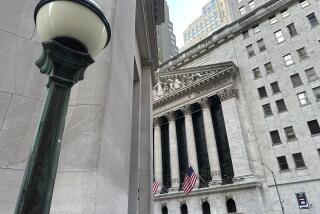Commodities tumble on fears that China will try to slow its economy
- Share via
The fast-running bull market in commodities hit a wall Friday as prices plunged on fears that China will try to slow its economy to tame inflation.
Rumors of another Chinese interest-rate hike started a chain reaction of selling across financial markets worldwide — and gave some investors the excuse they needed to take profits after racking up heady gains in raw materials, stocks and bonds since late August.
The Reuters/Jefferies CRB index of 19 major commodities slumped 11.27 points, or 3.6%, to close at 303.60, its biggest one-day loss since April 2009.
The stock market also was broadly lower on economic jitters. The Dow Jones industrial average slid 90.52 points, or 0.8%, to 11,192.58, though most broader U.S. indexes fell more than 1%.
And in a surprise, U.S. Treasury bond yields rose, unnerving investors who had expected interest rates to be held down by the Federal Reserve’s new program to buy massive amounts of government bonds over the next eight months.
The day’s steep losses in crude oil, sugar, soybeans, gold and other commodities were painful for investors but will be welcomed by consumers, who face the prospect of higher prices at stores as raw materials soar, many to levels not seen since before the economy plunged in 2008.
The benchmark price for crude oil in futures markets sank $2.93, or 3.3%, to $84.88 a barrel, after hitting a two-year high Thursday.
“The market was overdue for a correction,” said Frank Cholly, senior strategist at commodity trading firm Lind-Waldock & Co. in Chicago.
The surge in raw materials prices since August had been egged on by the falling dollar, as some investors sought hard assets to hedge against currency devaluation.
An index of the dollar’s value against six major currencies, including the euro and the yen, fell 14% from early June to its recent low on Nov. 4.
The greenback had been driven lower in part by expectations that the Fed would launch a program to flood the financial system with money in an effort to bolster U.S. economic growth and hold down longer-term interest rates.
On Nov. 3, the Fed committed $600 billion to buy Treasury securities through mid-2011.
But the next day, the dollar started rebounding modestly. That began to undercut demand for commodities in the last few days, traders said.
China then delivered a heavier blow to the market, announcing Thursday that the country’s inflation rate rose in October at the fastest pace in two years, pushed by food costs. That triggered expectations that Beijing would soon raise interest rates again to cool its economy, after an initial increase last month.
As trading opened Friday, Chinese stocks plummeted. The Shanghai composite index closed down 5.2%, its biggest one-day drop since August 2009.
Given China’s status as the world’s largest consumer of many raw materials, any hint of slower economic growth sends shudders through commodity markets. Prices began to plunge as markets opened around the world and continued to slide when U.S. trading opened.
“A lot of people decided to take some money off the table,” said Stephen Platt, a commodity analyst at Archer Financial Services in Chicago.
Among key commodities falling sharply Friday, gold sank $37.70, or 2.7%, to $1,365.40 an ounce; copper slid 12.95 cents, or 3.2%, to $3.89 a pound, and soybeans tumbled 67 cents, or 5%, to $12.63 a bushel.
Sugar was the day’s biggest loser, sinking more than 11%, to 26 cents a pound. Indian government data on Thursday hinted that the country might have a larger-than-expected surplus, easing supply concerns.
The sell-off in commodities didn’t surprise many analysts given the spectacular gains of the last two months. Likewise, many weren’t taken aback by the week’s losses in stocks. The Dow is down 2.2% from its two-year high of 11,444 reached Nov. 5, but still is up 14.3% since the end of August and 7.3% year to date.
Some Wall Street pros were more concerned about the day’s jump in Treasury bond yields.
The benchmark 10-year T-note yield rose to 2.75%, up from 2.65% Thursday and the highest since mid-September.
The T-note yield has risen from 2.49% the day after the Fed announced its bond-buying program.
Because bond yields had fallen sharply in September and October as the Fed began telegraphing its plans, there was some expectation that yields would rebound after the formal announcement — a classic case of “buy on the rumor, sell on the news,” in Wall Street parlance.
Still, the rise in Treasury yields over the last week has been bigger than some analysts anticipated. The five-year T-note yield, for example, rose to 1.34% on Friday, up from 1.20% on Thursday and the recent low of 1.03% on Nov. 4.
“People were just dumping their positions” in bonds on Friday, said Dan Greenhaus, chief economic strategist at Miller Tabak & Co. in New York.
What the rise in rates shows is that even though the Fed has begun purchasing huge quantities of Treasury bonds, “they aren’t the only entity in the market,” said John Spinello, a bond strategist at Jefferies Group in New York.
In other words, the Fed can hope to influence longer-term interest rates, but it can’t directly control them because the bond market is simply too large, Spinello said.
He and others worry that many Americans, after hearing for months about the Fed’s plans to buy bonds, had become convinced that it would guarantee a further decline in interest rates on bonds, mortgages and other loans.
If yields rise further, “the general public is going to have trouble understanding this,” Spinello said.
Some analysts worry that the sell-off in bonds could be a sign that foreign investors are registering their unhappiness with the policies of the Obama administration and the Fed.
The central bank’s plan to inject $600 billion into the financial system has been criticized by U.S. trading partners such as China, Germany and Brazil, who fear that the move could drive global inflation higher. That has been a particular sore point with China and other Asian economies already battling rising inflation.
What’s more, the Fed’s program could further weaken the dollar — which could help cut the cost of U.S. exports for foreign buyers, but in turn make other countries’ products more expensive for American buyers.
Tom Di Galoma, a veteran bond trader at Guggenheim Securities in New York, noted that President Obama left the summit of 20 industrialized countries’ leaders in South Korea without getting the accords on global economic policy that he had sought.
“He came back empty-handed,” Di Galoma said.
Some bond pros said there were vague rumors Friday that foreign investors, including China, were selling Treasury bonds. Dumping U.S. securities would be a way for foreigners to express their displeasure with, or lack of faith in, U.S. policies.
“I think the international community has had it with the lower dollar,” Di Galoma said.
More to Read
Inside the business of entertainment
The Wide Shot brings you news, analysis and insights on everything from streaming wars to production — and what it all means for the future.
You may occasionally receive promotional content from the Los Angeles Times.










